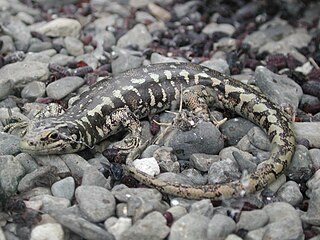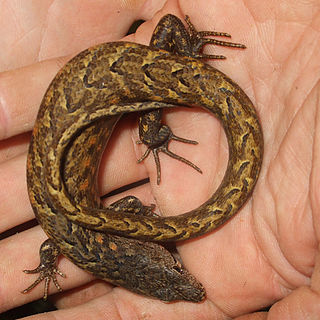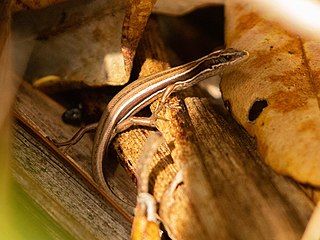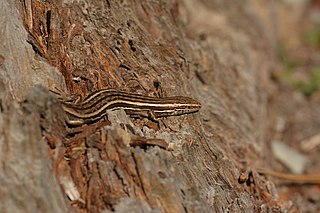
Oligosoma is a genus of small to medium-sized skinks found only in New Zealand, Norfolk Island and Lord Howe Island. Oligosoma had previously been found to belong to the Eugongylus group of genera in the subfamily Lygosominae; the Australian genus Bassiana appears to be fairly closely related.

The Otago skink is a rare, endangered species of large skink in the family Scincidae, found in the rocky canyons and grassy patches of Central Otago, New Zealand.

The grand skink is an endangered species of large skink endemic to the central Otago region of New Zealand.

Falla's skink, also known commonly as the Three Kings skink, is a species of lizard in the family Scincidae. The species is native to New Zealand.

The chevron skink is a large species of skink that is endemic to New Zealand. Previously found across Northland and the northern Auckland Region, it is now found only on the Great Barrier and Little Barrier islands in the Hauraki Gulf. A cryptic forest dweller, it can hide underwater. The chevron skink is the longest species of skink in New Zealand, reaching lengths of up to 340 mm (13 in). It is under threat from introduced rats.

Oligosoma infrapunctatum, the speckled skink, is a species of skink in the family Scincidae. It is endemic to New Zealand.

Oligosoma taumakae, the Open Bay Island(s) skink, or Taumaka skink, is a species of skink. It was described from the Open Bay Islands, off the west coast of the South Island of New Zealand.

The Fiordland skink is a species of skink endemic to the Fiordland temperate forests ecoregion of South Island, New Zealand. The Fiordland skink is found on one mainland locations and the exposed rocky shores of numerous islands along the Fiordland coast. Their distribution has declined due to introduced predators. Currently it lives only on foreshore rocks and boulder beaches on the Fiordland coast. It is abundant, even extremely abundant, in areas free from mammalian predators, but it barely survives where predators are present.

The moko skink is a species of lizard in the family Scincidae (skinks) that is endemic to New Zealand.

Anthony Hume Whitaker was a New Zealand herpetologist, contributing a 50-year career of fieldwork, pioneering research and species discoveries. His is still the largest collection of reptile and amphibian specimens donated to Museum of New Zealand Te Papa Tongarewa.

The Te Kakahu skink is a critically endangered species of skink native to New Zealand. When discovered, the entire species was inhabiting a single patch of clifftop vegetation on Chalky Island in Fiordland National Park.

The Burgan skink is a nationally endangered species of skink native to New Zealand. It was described from a specimen found near the Burgan Stream, in the Rock and Pillar Range, Central Otago.

The cryptic skink is a nationally vulnerable species of skink native to New Zealand.

The McCann's skink is a species of skink native to New Zealand.

The common skink, also known as the northern grass skink, is a species of skink native to New Zealand. Although historically classified as a subspecies of Oligosoma nigriplantare, it is likely to be given separate species status as data suggests it is a distinct species.

The brown skink is a species of skink native to New Zealand.

The Alborn skink is a critically endangered and poorly known species of skink only found in a single 2 ha site near Reefton, New Zealand. It is classified as "Nationally Critical" by the Department of Conservation under the New Zealand Threat Classification System.
The Hokitika skink is a poorly-known and critically endangered species of lizard in the family Scincidae (skinks) found only in the Hokitika area on the West Coast of New Zealand.

The Chesterfield or Kapitia skink is a species of skink found in New Zealand. Only discovered in 1994 and for years not recognised as a distinct species, it is endemic to a narrow 1 km strip of coastal vegetation on the West Coast of New Zealand, 15 km north of Hokitika. There are fewer than 200 individuals remaining in the wild. Oligosoma salmo is the only New Zealand skink with a prehensile tail, suggesting it was once arboreal and inhabited coastal forest, which was subsequently cleared for dairy farming. Following the partial destruction of its remaining habitat in 2018 by a cyclone, a small captive breeding population was established at Auckland Zoo.
The Westport skink is an undescribed species of lizard in the family Scincidae (skinks) known from just a single museum specimen, collected near Westport on the West Coast of New Zealand.


















